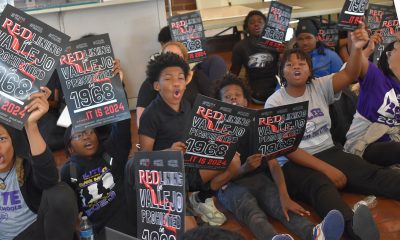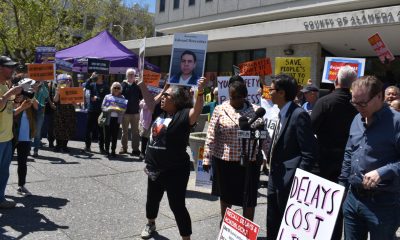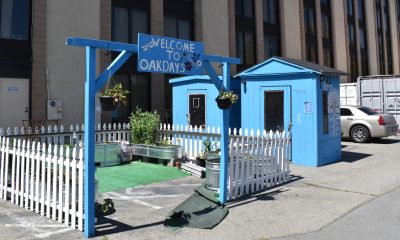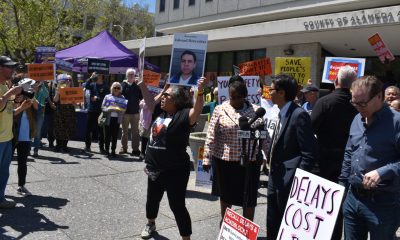City Government
The Race and Identity Profiling Advisory Board Releases Statewide Police Stop Data
The California Department of Justice’s Race and Identity Profiling Advisory (RIPA) Board published its seventh annual report this week. This report analyzes millions of vehicle and pedestrian stops conducted in 2022 by 560 law enforcement agencies in the state. Established in 2016 as a result of Assembly Bill (AB) 953 written by former Assemblymember Shirley Weber (D-San Diego), RIPA aims to eliminate racial and identity profiling and foster diversity and racial and identity sensitivity within law enforcement.

By Magaly Muñoz
The California Department of Justice’s Race and Identity Profiling Advisory (RIPA) Board published its seventh annual report this week. This report analyzes millions of vehicle and pedestrian stops conducted in 2022 by 560 law enforcement agencies in the state.
Established in 2016 as a result of Assembly Bill (AB) 953 written by former Assemblymember Shirley Weber (D-San Diego), RIPA aims to eliminate racial and identity profiling and foster diversity and racial and identity sensitivity within law enforcement.
The 223-page report features the board’s view of pretextual stops where the stops result in resisting arrest charges, looks at the impact police unions have on law enforcement accountability and protocols for law enforcement training on racial and identity profiling, and examines youth interactions with police both in and out of schools.
According to the report, Black individuals were stopped by police 132% more frequently than expected, based on a comparison of stop data and residential population. Black individuals made up 12.5% of stopped people, with Hispanic/Latino making up about 43% and white making up 32.5% of people.
The most frequently cited reasons for stops across all race and ethnic groups were traffic violations and reasonable suspicion that the person was engaged in criminal activity.
Under the new law AB 2773, law enforcement officers are required to state the reason for a traffic stop or pedestrian interaction before asking any other questions. The only exception is when there’s an imminent threat to life or property. This change, which took effect on Jan. 1, 2024, aims to reduce pretextual stops and de-escalate police-civilian interactions, according to Assemblymember Chris Holden (D-Pasadena), the bill’s author.
The RIPA report also made several recommendations to agencies, district attorney’s and the legislature including developing policies that require officers to notify supervisors prior to making an arrest for resisting arrest and have supervisors review any case where resisting arrest is alleged in a report; develop policies requiring district attorneys to review body-worn camera footage in any case that involves a resisting arrest allegation prior to filing charges; adopt internal policies that prohibit arrest and filing of charges against individuals if the alleged resisting stems from a disability.
In a statement released Wednesday, Attorney General Rob Bonta commented on the guidance that RIPA has given to the state that has allowed for transparency and critical steps to repair the public trust.
“The annual collection of the RIPA stop data is making California communities safer by directing thoughtful and reflective reform,” said Bonta.
But not everyone is in agreement that the data presented by RIPA is accurate or informative.
The Peace Officers Research Association of California (PORAC), an organization that represents 80,000 public safety members and over 950 associations, said the report “does not capture enough information for the Board to even satisfy California’s own legal standard for determining racial profiling.”
PORAC enlisted the help of Texas State University professor Dr. Brian Withrow to examine the data from the report which he found “inadequate in many ways.”
“The best data sets are those that recognize the complexities associated with an issue and provide robust qualitative information. However, the data the RIPA Board collects and analyzes — despite the breadth of its reach — is woefully inadequate as a measure of potential racial profiling in routine operations,” Withrow said in a statement.
The organization held a forum on Thursday morning to discuss the counter-report of the analysis of RIPA’s data report.
At the forum, Withrow argued that the data collected made it impossible to assess racial profiling because officers were not asked about the perceived race of drivers before the stop, only after. He also pointed out that the data does not capture context of police stops and officer actions, uses inaccurate population benchmarks because demographics of an area’s driving population are different than the overall population, does not accurately attribute the cause for a search, and does not differentiate between officer-initiated contacts and calls for service.
Withrow recommended that other factors such as age, gender, and context of the communities where officers are assigned should all be taken into consideration along with race. He proposed that members of the RIPA Board sit down with police officers one-on-one to better understand why they might make a stop and how they proceed once they do.
Activism
S.F. Black Leaders Rally to Protest, Discuss ‘Epidemic’ of Racial Slurs Against Black Students in SF Public School System
Parents at the meeting spoke of their children as no longer feeling safe in school because of bullying and discrimination. Parents also said that reported incidents such as racial slurs and intimidation are not dealt with to their satisfaction and feel ignored.

By Carla Thomas
San Francisco’s Third Baptist Church hosted a rally and meeting Sunday to discuss hatred toward African American students of the San Francisco Unified School District (SFUSD).
Rev. Amos C. Brown, president of the San Francisco NAACP and pastor of Third Baptist Church, along with leadership from local civil rights groups, the city’s faith-based community and Black community leadership convened at the church.
“There has been an epidemic of racial slurs and mistreatment of Black children in our public schools in the city,” said Brown. “This will not be tolerated.”
According to civil rights advocate Mattie Scott, students from elementary to high school have reported an extraordinary amount of racial slurs directed at them.
“There is a surge of overt racism in the schools, and our children should not be subjected to this,” said Scott. “Students are in school to learn, develop, and grow, not be hated on,” said Scott. “The parents of the children feel they have not received the support necessary to protect their children.”
Attendees were briefed last Friday in a meeting with SFUSD Superintendent Dr. Matt Wayne.
SFUSD states that their policies protect children and they are not at liberty to publicly discuss the issues to protect the children’s privacy.
Parents at the meeting spoke of their children as no longer feeling safe in school because of bullying and discrimination. Parents also said that reported incidents such as racial slurs and intimidation are not dealt with to their satisfaction and feel ignored.
Some parents said they have removed their students from school while other parents and community leaders called on the removal of the SFUSD superintendent, the firing of certain school principals and the need for more supportive school board members.
Community advocates discussed boycotting the schools and creating Freedom Schools led by Black leaders and educators, reassuring parents that their child’s wellbeing and education are the highest priority and youth are not to be disrupted by racism or policies that don’t support them.
Virginia Marshall, chair of the San Francisco NAACP’s education committee, offered encouragement to the parents and students in attendance while also announcing an upcoming May 14 school board meeting to demand accountability over their mistreatment.
“I’m urging anyone that cares about our students to pack the May 14 school board meeting,” said Marshall.
This resource was supported in whole or in part by funding provided by the State of California, administered by the California State Library via California Black Media as part of the Stop the Hate Program. The program is supported by partnership with California Department of Social Services and the California Commission on Asian and Pacific Islander American Affairs as part of the Stop the Hate program. To report a hate incident or hate crime and get support, go to CA vs Hate.
Bay Area
Mayor London Breed: State Awards San Francisco Over $37M for Affordable Housing
On April 30, Mayor London N. Breed announced San Francisco has been awarded more than $37.9 million in funding from the California Department of Housing and Community Development (HCD) as part of the State’s Multifamily Housing Program (MHP). The HCD loan will provide the final funding necessary for development of Casa Adelante – 1515 South Van Ness, a 168-unit affordable housing project located in San Francisco’s Mission District.

By Oakland Post Staff
On April 30, Mayor London N. Breed announced San Francisco has been awarded more than $37.9 million in funding from the California Department of Housing and Community Development (HCD) as part of the State’s Multifamily Housing Program (MHP).
The HCD loan will provide the final funding necessary for development of Casa Adelante – 1515 South Van Ness, a 168-unit affordable housing project located in San Francisco’s Mission District.
The new development at 1515 South Van Ness Ave. will provide 168 affordable homes to low-income families, formerly homeless families, and persons living with HIV earning between 25-80% of the San Francisco Area Median Income (AMI).
In addition, the project is anticipated to provide family-friendly amenities and ground floor community-serving commercial spaces that preserve the prevailing neighborhood character of the Calle 24 Latino Cultural District.
“This funding unlocks our ability to move on building affordable housing units for families in San Francisco at a crucial time. We understand the level of need for more housing that is accessible, and like the state, the city continues to face a challenging budget cycle,” said Breed. “1515 South Van Ness is a good example of what can be achieved in San Francisco when you have strong community partnerships and an unwavering commitment to deliver on critical needs for our residents.”
“From the beginning of my term as Supervisor, I have fought to bring affordable housing to 1515 South Van Ness” said Supervisor Hillary Ronen. “In the interim, the site has been utilized for homeless services and shelter, and I am thrilled that HCD has recognized the value of this development, and we are finally ready to break ground and bring 168 affordable homes to low income and formerly homeless families in the Mission.”
Owned and occupied by McMillan Electric Company until 2015, the City and County of San Francisco purchased 1515 South Van Ness Avenue in June 2019 with the intent of developing new affordable housing.
In November 2020, the San Francisco Mayor’s Office of Housing and Community Development (MOHCD) released a Multi-site Request for Qualifications (RFQ) seeking qualified developers to build affordable housing on the site, and subsequently selected Chinatown Community Development Corporation (CCDC) and Mission Economic Development Agency (MEDA) in May 2021 to develop the site.
The project is expected to begin construction in winter 2025.
“A strong, long-term push by Mission advocates to make this site 100% affordable is now paying off, with 168 family units that include services and childcare. People of color communities know what they need, and we are excited to be in partnership with a team, consisting of MEDA, CCDC, and MOHCD, that listens,” said Malcolm Yeung, Executive Director at CCDC.
“We are excited to be in partnership with CCDC, yet again, and for the opportunity to develop intergenerational affordable housing in the City’s Mission District,” said Luis Granados, executive director at MEDA.
Increasing housing affordable to lower-income and vulnerable residents is a key priority in the City’s Housing Element which calls for additional funding for affordable housing production and preservation, as well as Mayor Breed’s Housing for All Executive Directive that sets out the steps the City will take to meet the bold goal of allowing for 82,000 new homes to be built over the next eight years.
Tuesday’s funding announcement emphasizes the importance of regional and state collaboration in order to reach our housing and climate goals.
“We are thrilled—not just to bring a project of this size to a community with great need — but to do so with community-based developers and their partners who understand the neighborhood and sensitivities around cultural preservation,” said HCD Director Gustavo Velasquez.
City Government
Vallejo Continues to Accept Applications for Boards, Committees and Commissions
The City of Vallejo is requesting applications to serve on a number of the City’s boards and commissions. Vallejo residents who are interested in serving on an advisory body are invited to submit an application and supplemental questionnaire for consideration.
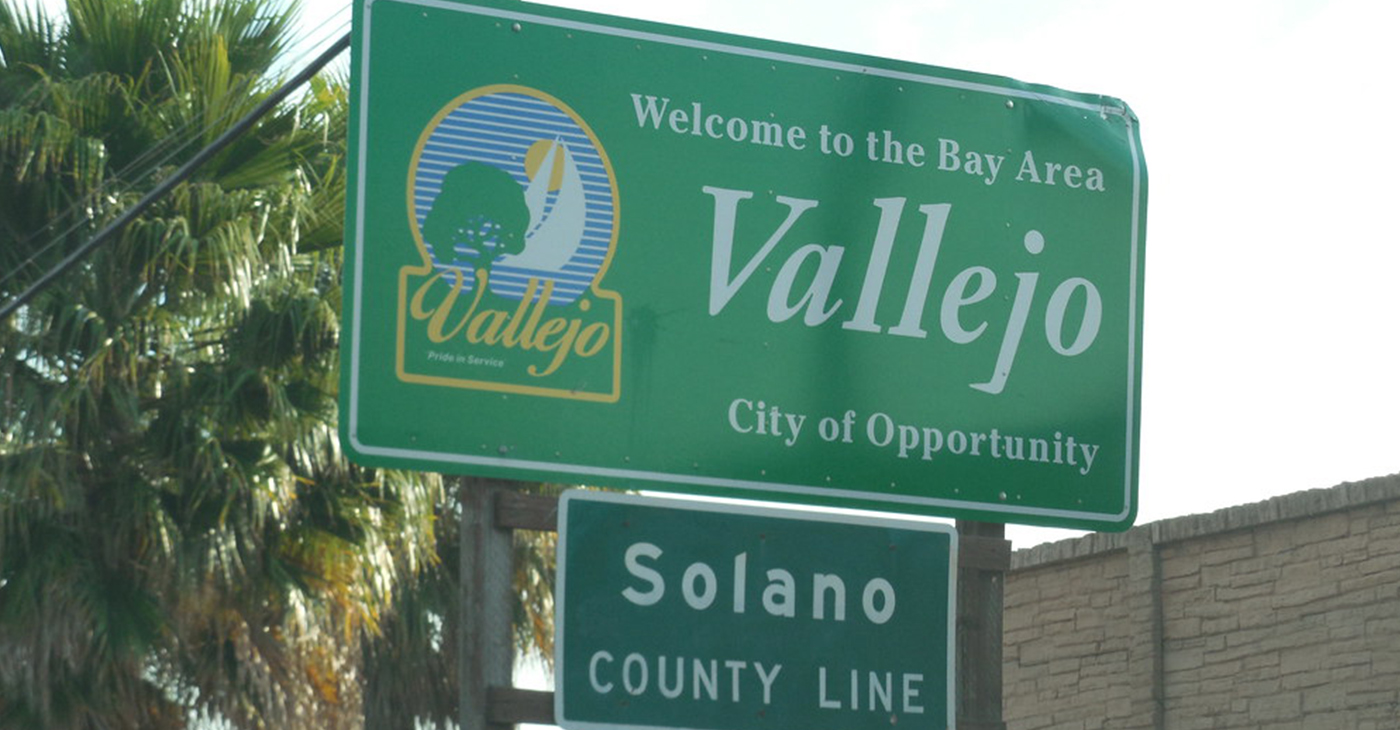
By City of Vallejo
The City of Vallejo is requesting applications to serve on a number of the City’s boards and commissions. Vallejo residents who are interested in serving on an advisory body are invited to submit an application and supplemental questionnaire for consideration.
There are currently openings on the following boards, commissions, and committees:
- Beautification Commission(2) terms expire 6/30/28
- Civil Service Commission(2) terms to expire 6/30/28
- Design Review Board(2) terms to expire 6/30/28
- Housing & Community Development Commission(1) term to expire 6/30/28
- Housing Authority(1) tenant commissioner term to expire 12/31/24
- McCune Collection Commission(3) terms to expire 6/30/28
- Participatory Budget Steering Committee(6 members & 3 alternates) terms expire 6/30/25
- Planning Commission(2) terms to expire 6/30/28
- Surveillance Advisory Board – Districts 1, 2, and 3 Members OnlyDistricts 1 & 3 terms to expire 1/2/25 and District 2 term to expire 1/5/27
- Sister City Commission(1) term to expire 6/30/27
- Solano Commission for Women & Girls(1) Vallejo representative can be youth or adult. Term to expire 4 years from date of appointment
For City Boards and Commissions, except for the Civil Service, McCune Collection, and Sister City Commissions, the Surveillance Advisory Board, and the Participatory Budgeting Steering Committee, all appointed members must complete and file a Statement of Economic Interests, Form 700, within 30 days of appointment.
All City Board and Commission members must complete AB 1234 Ethics training and file a Certificate of Completion within 30 days of appointment.
In most instances, to be eligible for appointment, applicants must be residents of the City of Vallejo. Information regarding the duties of each board and commission and specific criteria for appointment may be found within each application. With some exceptions, appointments are typically for a term of four years.
The application period will remain open until a sufficient number have been received in the City Clerk’s Office
Interviews with the City Council are tentatively scheduled for the evenings of June 3 and 10. Applicants must attend the interview to be considered for appointment on a board or commission.
Application forms and supplemental questionnaires are accessible in several ways:
- The City’s website, located on the Boards and Commissions page
- At City Hall, Office of the City Clerk, 555 Santa Clara Street, 3rd Floor, Vallejo, CA
- By Email at abrahamson@cityofvallejo.net, or by phone at (707) 648-4527
By U.S. Mail: City of Vallejo, C/O City Clerk, PO Box 3068, Vallejo, CA 94590
-

 Community3 weeks ago
Community3 weeks agoFinancial Assistance Bill for Descendants of Enslaved Persons to Help Them Purchase, Own, or Maintain a Home
-

 City Government5 days ago
City Government5 days agoCourt Throws Out Law That Allowed Californians to Build Duplexes, Triplexes and RDUs on Their Properties
-

 Business3 weeks ago
Business3 weeks agoV.P. Kamala Harris: Americans With Criminal Records Will Soon Be Eligible for SBA Loans
-

 Activism2 weeks ago
Activism2 weeks agoOakland Post: Week of April 24 – 30, 2024
-

 Activism4 weeks ago
Activism4 weeks agoOakland Post: Week of April 10 – 16, 2024
-

 Community3 weeks ago
Community3 weeks agoAG Bonta Says Oakland School Leaders Should Comply with State Laws to Avoid ‘Disparate Harm’ When Closing or Merging Schools
-

 Community3 weeks ago
Community3 weeks agoRichmond Nonprofit Helps Ex-Felons Get Back on Their Feet
-

 Community3 weeks ago
Community3 weeks agoOakland WNBA Player to be Inducted Into Hall of Fame


